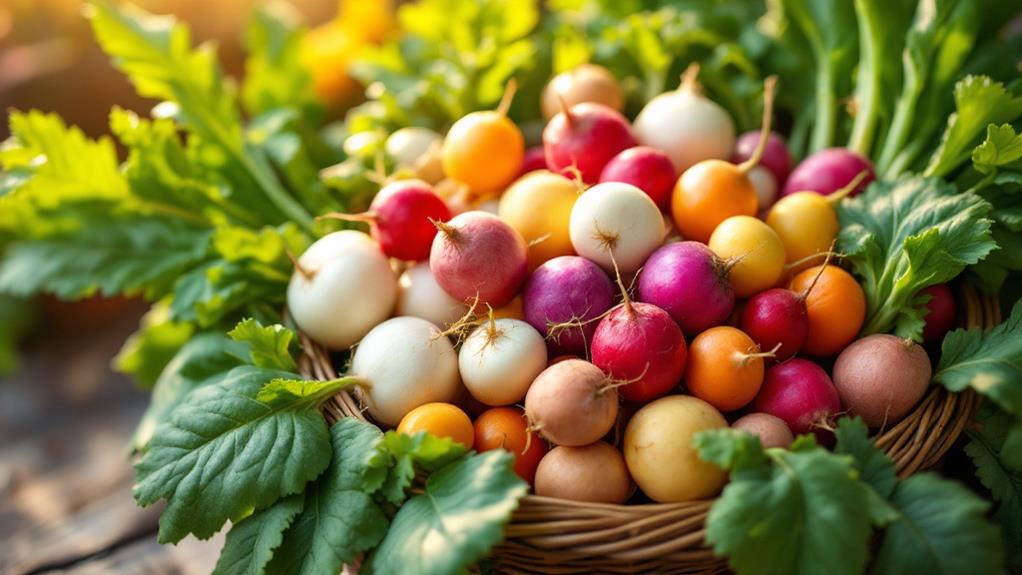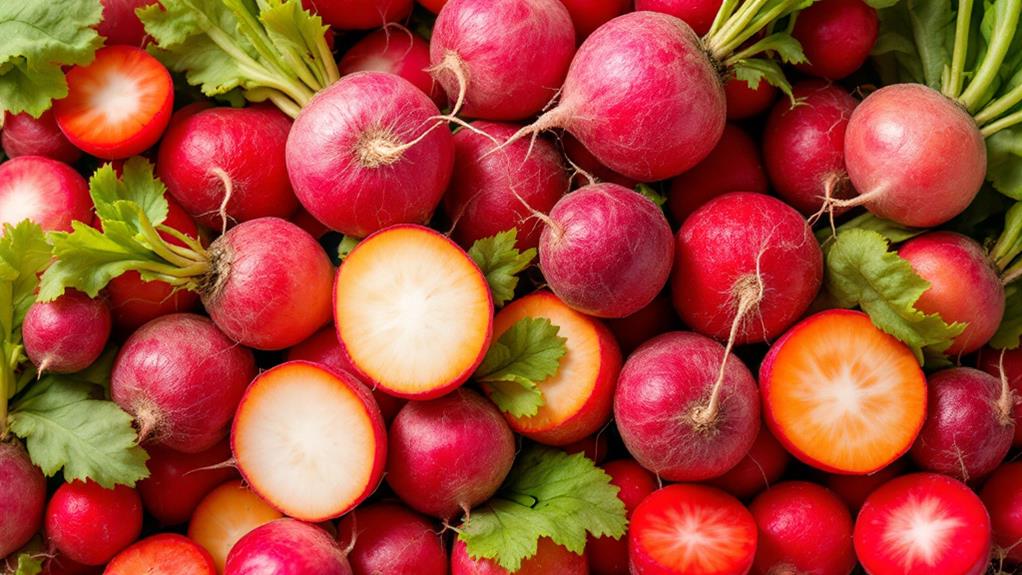Types and Health Benefits of Radish: Why You Should Add It to Your Diet

You should definitely add radishes to your diet because they're not only low in calories but also packed with nutrients. There's a type for every taste: red radishes offer zing, daikon ones provide a milder crunch, while watermelon radishes surprise with their lively color. These root vegetables are rich in vitamin C and antioxidants, supporting your immune system and reducing disease risk. They're also filled with fiber and potassium, enhancing heart health and aiding digestion. Enjoy them fresh, roasted, or pickled; each way adds a unique twist to meals. Uncover all the flavors and benefits waiting for you.
What Are Radishes?
Radishes, crunchy root vegetables from the Brassica family, are known for their distinct spicy flavor and nutritional benefits. As a staple in many kitchens, radishes, especially the popular Raphanus sativus variety, are celebrated not just for their taste but also for their impressive health benefits. They're low in calories, with only about 1 calorie per radish, making them an excellent choice if you're focusing on weight management.
These root vegetables are more than just a healthy snack; they're a powerhouse of vitamin C, a vital nutrient that supports your immune system and skin health. Including radishes in your meals can improve your overall wellness. Their crunchy texture and spicy kick make them a versatile supplement to salads and other dishes, providing both flavor and a satisfying bite.
Types of Radishes
When exploring the distinct world of radishes, you'll uncover several types, each with unique flavors and appearances. Red radishes, with their round shape and sweet, peppery flavor, are perfect for salads and garnishes. They're not only tasty but also packed with dietary fiber and antioxidants, offering health benefits you shouldn't overlook.
Daikon radishes stand out with their larger, cylindrical form. A staple in Asian cuisine, they boast a milder taste compared to other kinds, making them versatile in numerous dishes. These vegetables also bring valuable nutrients to your diet.
Watermelon radishes are a feast for the eyes with their white and green exterior and striking magenta flesh. Their unique peppery flavor adds both visual and taste appeal to any meal.
Black radishes, with their rough black skin and intense, sharp flavor, are often used for their potential health benefits. They're a great choice if you're seeking a natural remedy.
Nutritional Value

Packed with nutritional benefits, radishes are a smart improvement to your diet. With only 10 calories in an 80g serving, radishes are an excellent low-calorie food choice, perfect for weight management. The nutritional value doesn't stop there; these crunchy vegetables are a good source of dietary fiber, providing 1.0g per half-cup serving. This fiber content supports digestive health and helps maintain regular bowel movements, keeping your system running smoothly.
Radishes are also rich in vitamin C, delivering about 14mg per serving. This vitamin plays an essential role in enhancing your immune function and offering antioxidant protection against harmful free radicals. Furthermore, radishes contain 192mg of potassium per half-cup serving, critical for maintaining healthy blood pressure and promoting cardiovascular health. Including radishes in your meals can help you manage blood pressure effectively.
Moreover, don't overlook the folate content in radishes. With 30mcg per serving, folate is significant for cell division and general health. By incorporating radishes into your meals, you're not just adding flavor and crunch, but also a wealth of nutrients that support numerous bodily functions. So, why not make radishes a regular part of your diet?
Health Benefits
Incorporating radishes into your diet offers a multitude of health benefits. With only 1 calorie per radish, they're a perfect supplement to weight-loss diets, providing crucial nutrients without the extra calories. Their high vitamin C content enhances your immune system, keeping you healthy and energized. Radishes are packed with antioxidants, which help combat oxidative stress, reducing inflammation and the risk of chronic diseases like heart disease and diabetes.
Cancer prevention is another significant health benefit of radishes. Regular consumption is linked to a reduced risk of numerous cancers, such as colon and stomach cancer. This is due to their detoxifying properties and compounds that inhibit tumor development. So, including radishes in your meals might just be a small step towards long-term health.
For those concerned about heart health, radishes are rich in potassium, a mineral that helps regulate blood pressure and improve cardiovascular function. Meanwhile, the fiber content in radishes promotes digestive health, aiding in regular bowel movements and alleviating constipation. By incorporating radishes into your diet, you're supporting your body's natural processes and contributing to your complete wellbeing. So, why not add these crunchy, nutritious vegetables to your next meal?
Ways to Eat Radishes

Some might find radishes to be a surprisingly adaptable ingredient in the kitchen. One of the simplest ways to eat radishes is by adding fresh radish slices to your salad. Their crunchy texture and peppery flavor can raise any radish salad, making it both invigorating and lively. If you prefer something warm, roasted radishes are a fantastic option. Toss them with olive oil and garlic, and you'll transform their sharpness into a savory side dish that pairs wonderfully with multiple meals.
Another exciting way to enjoy radishes is by pickling. Pickling radishes in vinegar and spices creates a tangy condiment that improves flavors and extends shelf life, making it a great topping for tacos or sandwiches. Speaking of sandwiches, adding sliced radishes as a topping for burgers not only adds crunch but also a delightful visual appeal.
Don't overlook radish greens! They're edible and can be used in soups, salads, or even made into pesto. This not only reduces waste but also increases your meal's nutritional profile with added vitamins and minerals. Regardless of being raw, roasted, or pickled, radishes offer a multitude of delicious options to investigate.




